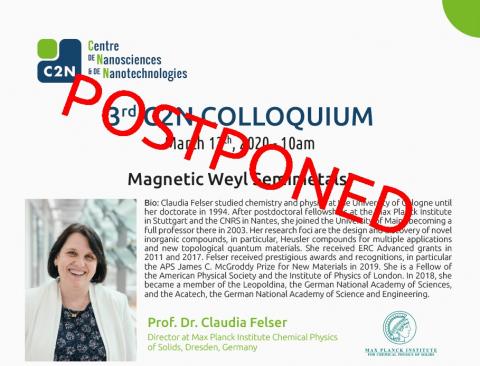
Third C2N Colloquium: Claudia Felser
The C2N is pleased to welcome Prof. Claudia Felser for its Third Colloquium, that will be held on March 13th (at 10AM) at the Amphitheater of C2N, at the heart of Paris-Saclay campus. Claudia Felser is Professor and Director of the Max Planck Institute for Chemical Physics of Solids, in Dresden (Germany). Her research focuses on the design and synthesis of new materials, materials for energy technologies (solar cells, thermoelectrics, catalysis), spintronics, Heusler compounds, topological materials and photoemission. She is a Member of the German Academy of Sciences Leopoldina since 2018, and co-recipient of the 2019 James C. McGroddy Prize (American Physical Society) for New Materials.
His lecture, open to a general audience, will be about:
Magnetic Weyl Semimetals!
Abstract: Topology, a mathematical concept, recently became a hot and truly transdisciplinary topic in condensed matter physics, solid state chemistry and materials science. Since there is a direct connection between real space: atoms, valence electrons, bonds and orbitals, and reciprocal space: bands, Fermi surfaces and Berry curvature, a simple classification of topological materials in a single particle picture should be possible.
Binary phosphides are an ideal material class for a systematic study of Dirac, Weyl and new Fermion physics, since these compounds can be grown as high-quality single crystals. Beyond Weyl and Dirac, new fermions can be identified in compounds that have linear and quadratic 3-, 6- and 8- band crossings that are stabilized by space group symmetries. In magnetic materials the Berry curvature and the classical anomalous Hall (AHE) and spin Hall effect (SHE) helps to identify potentially interesting candidates. As a consequence, the magnetic Heusler compounds have already been identified as Weyl semimetals: for example, Co2YZ, and Co3Sn2S2.
The Anomalous Hall angle also helps to identify materials in which a Quantum anomalous Hall (QAHE) should be possible in thin films. Heusler compounds with non-collinear magnetic structures also possess real-space topological states in the form of magnetic antiskyrmions, which have not yet been observed in other materials.
Bio: Claudia Felser studied chemistry and physics at the University of Cologne until her doctorate in 1994. After postdoctoral fellowships at the Max Planck Institute in Stuttgart and the CNRS in Nantes, she joined the University of Mainz becoming a full professor there in 2003. Her research foci are the design and discovery of novel inorganic compounds, in particular, Heusler compounds for multiple applications and new topological quantum materials. She received ERC Advanced grants in 2011 and 2017. Felser received prestigious awards and recognitions, in particular the APS James C. McGroddy Prize for New Materials in 2019. She is a Fellow of the American Physical Society and the Institute of Physics of London. In 2018, she became a member of the Leopoldina, the German National Academy of Sciences, and the Acatech, the German National Academy of Science and Engineering.
The seminar will be followed by a discussion between Claudia Felser and the PhD students and Post-docs, and a cocktail will be served in the C2N main hall.
10 boulevard Thomas Gobert - PalaiseauThe C2N is pleased to welcome Prof. Claudia Felser for its Third Colloquium, that will be held on March 13th (at 10AM) at the Amphitheater of C2N, at the heart of Paris-Saclay campus. Claudia Felser is Professor and Director of the Max Planck Institute for Chemical Physics of Solids, in Dresden (Germany). Her research focuses on the design and synthesis of new materials, materials for energy technologies (solar cells, thermoelectrics, catalysis), spintronics, Heusler compounds, topological materials and photoemission. She is a Member of the German Academy of Sciences Leopoldina since 2018, and co-recipient of the 2019 James C. McGroddy Prize (American Physical Society) for New Materials.
His lecture, open to a general audience, will be about:
Magnetic Weyl Semimetals!
Abstract: Topology, a mathematical concept, recently became a hot and truly transdisciplinary topic in condensed matter physics, solid state chemistry and materials science. Since there is a direct connection between real space: atoms, valence electrons, bonds and orbitals, and reciprocal space: bands, Fermi surfaces and Berry curvature, a simple classification of topological materials in a single particle picture should be possible.
Binary phosphides are an ideal material class for a systematic study of Dirac, Weyl and new Fermion physics, since these compounds can be grown as high-quality single crystals. Beyond Weyl and Dirac, new fermions can be identified in compounds that have linear and quadratic 3-, 6- and 8- band crossings that are stabilized by space group symmetries. In magnetic materials the Berry curvature and the classical anomalous Hall (AHE) and spin Hall effect (SHE) helps to identify potentially interesting candidates. As a consequence, the magnetic Heusler compounds have already been identified as Weyl semimetals: for example, Co2YZ, and Co3Sn2S2.
The Anomalous Hall angle also helps to identify materials in which a Quantum anomalous Hall (QAHE) should be possible in thin films. Heusler compounds with non-collinear magnetic structures also possess real-space topological states in the form of magnetic antiskyrmions, which have not yet been observed in other materials.
Bio: Claudia Felser studied chemistry and physics at the University of Cologne until her doctorate in 1994. After postdoctoral fellowships at the Max Planck Institute in Stuttgart and the CNRS in Nantes, she joined the University of Mainz becoming a full professor there in 2003. Her research foci are the design and discovery of novel inorganic compounds, in particular, Heusler compounds for multiple applications and new topological quantum materials. She received ERC Advanced grants in 2011 and 2017. Felser received prestigious awards and recognitions, in particular the APS James C. McGroddy Prize for New Materials in 2019. She is a Fellow of the American Physical Society and the Institute of Physics of London. In 2018, she became a member of the Leopoldina, the German National Academy of Sciences, and the Acatech, the German National Academy of Science and Engineering.
The seminar will be followed by a discussion between Claudia Felser and the PhD students and Post-docs, and a cocktail will be served in the C2N main hall.
